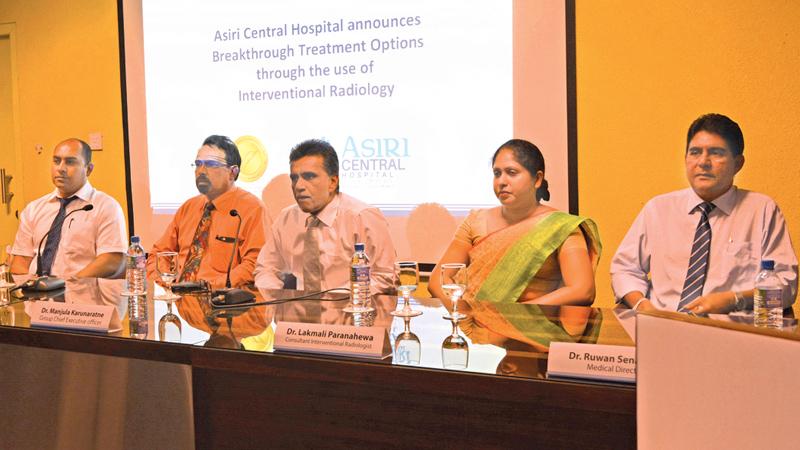
Asiri Central Hospital announced breakthrough treatment options through the use of interventional radiology at a press briefing in Colombo recently.
“This is a new field of medicine and is growing. The use of interventional radiology will simplify treatment and minimize physical and psychological trauma,” Asiri Group Chief Executive Officer, Dr. Manjula Karunaratne said.
The hospital’s multifunctional interventional radiology unit offers significant advancement in the diagnosis and treatment of aneurysms, strokes and other neurovascular conditions through its state-of-the art and one of Sri Lanka’s first private sector, Biplaner Catheterization laboratories.
The Biplane Digital Subtraction Angiography unit was commissioned in 2013 by Asiri Central Hospital with an investment of Rs. 150 million. On par with sophisticated international standards, using biplane technology, radiologists have access to large screen visualizations of the brain arterial network, with over 100 percent accuracy to aid quick and better understanding for safe interventions.
The unit is managed by two dedicated, trained and experienced Consultant Interventional Radiologists, Dr. Nihal Wijewardena and Dr. Lakmalie Paranahewa.
“We have a very capable group of in-house specialists in our team including Stroke Physician Dr. Thurul Attigala and Consultant Neuro Surgeon Dr. Sunil Perera.
There are also trained groups of radiographers and nurses working in the unit on 24/7 basis,” Dr. Lakmalie Paranahewa said.
“This is the first dedicated Biplane Neuro Cath Lab in Sri Lanka and we have done a large number of neuro interventions with very successful results, she said.
Today, neuro intervention is recognized as a minimally invasive approach to repair brain vascular diseases, resulting in a shorter recovery time, less side effects, and patients benefiting immensely from the faster recovery period.
As it is not open surgery and only a puncture in the groin, the patients can return to their normal routine within a short period. - SJ
